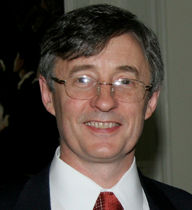0
DAYS

0
DAYS
0
HOURS
0
MINUTES
0
SECONDS
A major seaside resort town on the northern Bulgarian Black Sea Coast in the municipality of Varna.
- Paper Deadline: May 15th May 22nd (extended)
- Author Notifications: July 10th, 2019
- Camera-ready: August 1st, 2019
Prof. Alexander Balinsky (Cardiff School of Mathematics)
Prof. Peter McCullagh (University of Chicago)

Professor Alexander Balinsky
Cardiff School of Mathematics, UK
Mathematics of Deep Learning
Deep Learning is another name for a set of algorithms that use a neural network as an architecture. In the past few years, Deep Learning has generated much excitement due to many breakthrough results in speech recognition, computer vision and text processing. This recent success has been due to new mathematical techniques, the availability of inexpensive, parallel hardware (GPUs, computer clusters) and massive amounts of data. This powerful way of processing data can be used to address an ever-growing number of problems, and its impact on science and society is increasing exponentially. In this talk we present mathematical foundations of Deep Learning, relations with physics , features extraction and interpretability. We also explain mathematics behind adversarial attacks and how to protect against them. Several new mathematical problems will be presented.
Prof. Balinsky was founding member of Cardiff Communication Research Centre. He had several Hewlett-Packard joint research projects. He also did consultancy work for Reuters, London on mathematical models for Internet Security. His Impact Case Study "Meeting the Challenges of Data Security: Detecting Unusual Behaviour and Mining Unstructured Data" was featured in the leading article 'The impact of impact' in Times Higher.

Professor Peter McCullagh
Department of Statistics, University of Chicago, USA
Prediction and exchangeable processes
This talk will present an overview of recent and not-so-recent work on a variety of exchangeable processes, including partition processes where the observation space is the set of partitions of [n] or equivalence relations on [n], and ordered partition processes where the observation space is the set of partial rankings of [n]. The connection with fiducial processes, Dirichlet processes and survival processes will be discussed.
Prof. McCullagh (FRS) is a member of the Royal Society and the American Academy of Arts and Sciences. He won the COPSS Presidents' Award in 1990. He was the recipient of the Royal Statistical Society's Guy Medal in Bronze in 1983 and in Silver in 2005. He was also the recipient of the inaugural Karl Pearson Prize of the International Statistical Institute. He won a Notable Alumni Award in 2007 from his grammar school, St Columb's College.
Conference Registration
Lunch
Welcome Speech and short history of Machine Learning at RHUL
Invited Talk 1
Chair: Alex Gammerman
"Mathematics of Deep Learning"
Prof. Alexander Balinsky
Tea/Coffee Break
Conformal Prediction (1)
Chair: Zhiyuan Luo
"Interpretable and Specialized Conformal Predictors"
Ulf Johansson, Tuwe Löfström and Henrik Boström
"Ensembles based on Conformal Instance Transfer"
Shuang Zhou, Evgueni Smirnov and Gijs Schoenmakers
"Split Knowledge Transfer in Learning Under Privileged Information Framework"
Niharika Gauraha, Fabian Söderdahl and Ola Spjuth
Conference Reception
Conformal Prediction (2)
Chair: Henrik Boström
"Combining Prediction Intervals on Multi-Source Non-Disclosed Regression Datasets"
Ola Spjuth, Robin Carrión Brännström, Lars Carlsson and Niharika Gauraha
"Conformal Predictor Combination using Neyman-Pearson Lemma"
Paolo Toccaceli
"Test statistics and p-values"
Yuri Gurevich and Vladimir Vovk
Tea/Coffee Break
Conformal Prediction (3)
Chair: Harris Papadopoulos
"Universally consistent conformal predictive distributions"
Vladimir Vovk
"Predicting with Confidence from Survival Data"
Henrik Boström, Ulf Johansson and Anders Vesterberg
"Coreset-based Conformal Prediction for Large-scale Learning"
Nery Riquelme-Granada, Khuong An Nguyen and Zhiyuan Luo
Lunch
Invited Talk 2
Chair: Vladimir Vovk
"Prediction and exchangeable processes"
Prof. Peter McCullagh
Tea/Coffee Break
Probabilistic prediction
Chair: Claus Bendtsen
"Online Learning with Continuous Ranked Probability Score"
Vladimir V'Yugin and Vladimir Trunov
"Competitive Online Regression under Continuous Ranked Probability Score"
Raisa Dzhamtyrova and Yuri Kalnishkan
Poster presentations
Chair: Evgueni Smirnov
"Conformal clustering for functional variables, with an application to electricity consumption curves"
Ilia Nouretdinov, Matteo Fontana, James Gammerman, Laura Shelmit and Daljit Rehal
"Conformal Anomaly Detection based on Association Rules"
Ilia Nouretdinov, James Gammerman and Daljit Rehal
"Sorting email with natural language processing and conformal prediction"
Patrizio Giovannotti and Daljit Rehal
Conference Dinner
Applications
Chair: Lars Carlsson
"Conformal Prediction for Students' Grades in a Course Recommender System"
Raphael Morsomme and Evgueni Smirnov
"Applying Conformal Prediction to control an exoskeleton"
Charalambos Eliades and Harris Papadopoulos
"A Deep Neural Network Conformal Predictor for Multi-label Text Classification"
Andreas Paisios, Ladislav Lenc, Jirf Martinek, Pavel Kral and Harris Papadopoulos
Best Paper Award and Closing Address
The main purpose of conformal prediction is to complement predictions delivered by various algorithms of Machine Learning with provably valid measures of their accuracy and reliability under the assumption that the observations are independent and identically distributed. It was originally developed in the late 1990s and early 2000s but has become more popular and further developed in important directions in recent years.
Conformal prediction is a universal tool in several senses; in particular, it can be used in combination with any known machine-learning algorithm, such as SVM, Neural Networks, Ridge Regression, etc. It has been applied to a variety of problems from diagnostics of depression to drug discovery to the behaviour of bots.
A sister method of Venn prediction was developed at the same time as conformal prediction and is used for probabilistic prediction in the context of classification. Among recent developments are adaptations of conformal and Venn predictors to probabilistic prediction in the context of regression.
The COPA series of workshops is a home for work in both conformal and Venn prediction, as reflected in its full name “Conformal and Probabilistic Prediction with Applications”. The aim of this symposium is to serve as a forum for the presentation of new and ongoing work and the exchange of ideas between researchers on any aspect of Conformal and Probabilistic Prediction and their applications to interesting problems in any field.
Topics of the symposium include, but are not limited to:
Authors are invited to submit original, English-language research contributions or experience reports. Papers should be no longer than 20 pages formatted according to the well-known JMLR (Journal of Machine Learning Research) style. The LaTeX package for the style is available here. All aspects of the submission and notification process will be handled online via the EasyChair Conference System at:
There will be two Alexey Chervonenkis awards for the Best Paper and Best Student Paper, presented at the conference.
Researchers interested in Conformal Prediction may be interested in joining our online discussion group. Future announcements and related materials will be published regularly.
https://groups.google.com/forum/#!forum/conformal-prediction
All accepted papers will be presented at the conference and published by the Proceedings of Machine Learning Research (PMLR) Volume 105 at http://proceedings.mlr.press/v105/
Please make sure to use the correct style file; it should be already installed on your computer, or will be installed "on the fly". The camera-ready papers should follow the style of the Proceedings section of JMLR rather than JMLR itself.
In the end you should submit two files: (1) file containing your paper in the pdf format; (2) copyright form (http://proceedings.mlr.press/pmlr-license-agreement.pdf)
The beginning of your file will look like:
\documentclass[wcp]{jmlr}
\usepackage{amsmath,amssymb,graphicx,url}
\jmlrvolume{105}
\jmlryear{2019}
\jmlrworkshop{Conformal and Probabilistic Prediction and Applications}
\jmlrproceedings{PMLR}{Proceedings of Machine Learning Research}
\title{Nonparametric predictive distributions based on conformal prediction}
\author{\Name{John Smith}\Email{j.smith@gmail.com}\\
\addr{Royal Holloway, University of London, Egham, Surrey, UK}\\
\Name{Minge Shen}\Email{m.shen@gmail.com}\\
\addr{Rutgers University, New Brunswick, NJ, USA}}
\editor{Alex Gammerman, Vladimir Vovk, Zhiyuan Luo and Evgueni Smirnov}
\begin{abstract}
This paper applies conformal prediction to derive predictive distributions that are valid under a nonparametric assumption.
\end{abstract}
\begin{keywords}
Conformal prediction, predictive distributions, regression.
\end{keywords}
Notice the presence of the command
\jmlrproceedings{PMLR}{Proceedings of Machine Learning Research}
It has become necessary after the recent rebranding http://proceedings.mlr.press of JMLR W&CP as the Proceedings of Machine Learning Research (PMLR).
Please let us know if you encounter any problems following these instructions.
For further information (which, however, can be confusing), see http://jmlr.org/proceedings/faq.html (under the heading "What is the Style File for the Proceedings?"); COPA 2019 uses the one column style file. The style file is available from the CTAN (Comprehensive TeX Archive Network) web site at http://ctan.org/tex-archive/macros/latex/contrib/jmlr you can go inside the directory called "sample_papers" and emulate the files jmlr_sample.tex and jmlr_sample.bib (the latter is only needed if you use bibtex).
A lot of useful advice on the JMLR style can be found at http://jmlr.org/format/format.html (however, please make sure to use the Proceedings style, as described above, rather than the main journal style).
Centre for Machine Learning
Royal Holloway, University of London
Egham, United Kingdom
Manager Events and Reservations
Company for International Meetings Ltd.
18 Christo Belchev Str., Sofia, Bulgaria




